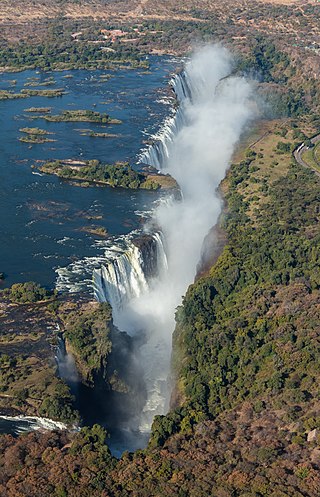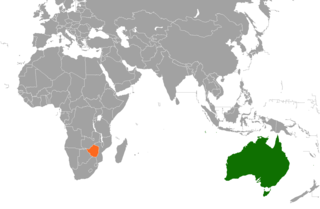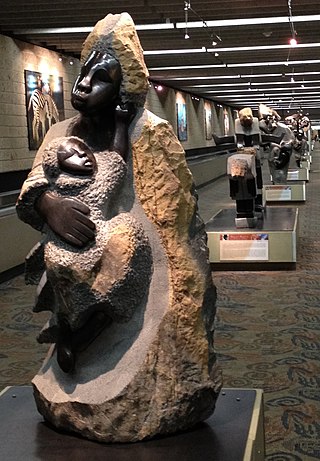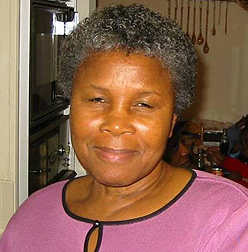Related Research Articles
Until roughly 2,000 years ago, what would become Zimbabwe was populated by ancestors of the San people. Bantu inhabitants of the region arrived and developed ceramic production in the area. A series of trading empires emerged, including the Kingdom of Mapungubwe and Kingdom of Zimbabwe. In the 1880s, the British South Africa Company began its activities in the region, leading to the colonial era in Southern Rhodesia.

Rhodesia, officially from 1970 the Republic of Rhodesia, was an unrecognised state in Southern Africa from 1965 to 1979. During this fourteen-year period, Rhodesia served as the de facto successor state to the British colony of Southern Rhodesia, and in 1980 it became modern day Zimbabwe.

Demographic features of the population of Zimbabwe include population density, ethnicity, education level, health of the populace, economic status, religious affiliations and other aspects of the population.
The Gukurahundi was a series of mass killings and genocide in Zimbabwe which were committed from 1983 until the Unity Accord in 1987. The name derives from a Shona language term which loosely translates to "the early rain which washes away the chaff before the spring rains".

Victoria Falls is a waterfall on the Zambezi River, located on the border between Zambia and Zimbabwe. It is one of the world's largest waterfalls, with a width of 1,708 m (5,604 ft). The region around it has a high degree of biodiversity in both plants and animals.

The prime minister of Rhodesia was the head of government of Rhodesia. Rhodesia, which had become a self-governing colony of the United Kingdom in 1923, unilaterally declared independence on 11 November 1965, and was thereafter an unrecognized state until 1979. In December 1979, the country came under temporary British control, and in April 1980 the country gained recognized independence as Zimbabwe.

Zimbabwe has many different cultures, which may include beliefs and ceremonies, one of them being Shona. Zimbabwe's largest ethnic group is Shona.
The following lists events that happened during 1980 in Zimbabwe.
Gibson Mashingaidze is a former army general and head of Zimbabwean sports.

Joram Mariga has been called the “Father of Zimbabwean Sculpture” because of his influence on the local artistic community starting in the 1950s and continuing until his death in 2000. The sculptural movement of which he was part is usually referred to as “Shona sculpture”, although some of its recognised members are not ethnically Shona.
This article gives lists of the National Monuments and other historic sites of Zambia, with a one- or two-line description providing links to details given on other pages.
Zimbabwean art includes decorative esthetics applied to many aspects of life, including art objects as such, utilitarian objects, objects used in religion, warfare, in propaganda, and in many other spheres. Within this broad arena, Zimbabwe has several identifiable categories of art. It is a hallmark of African cultures in general that art touches many aspects of life, and most tribes have a vigorous and often recognisable canon of styles and a great range of art-worked objects. These can include masks, drums, textile decoration, beadwork, carving, sculpture, ceramic in various forms, housing and the person themselves. Decoration of the body in permanent ways such as scarification or tattoo or impermanently as in painting the body for a ceremony is a common feature of African cultures.

Foreign relations exist between Australia and Zimbabwe. Both countries have full embassy level diplomatic relations. Australia maintains an embassy in Harare, and Zimbabwe maintains an embassy in Canberra.

Sculpture and in particular stone sculpture is an art for which Zimbabwe is well known around the world.

Rhodesian passports were passports issued by the government of Rhodesia to its citizens for purposes of international travel. They are no longer issued, having been superseded by Zimbabwean passports in 1980, with the country's reconstitution and renaming as Zimbabwe. Rhodesian passports were ostensibly valid for travel by Rhodesians anywhere in the world, but in practice they were accepted by very few countries.
Dunn Mabika Hove, also known as Paris Checherere was a Zimbabwean military intelligence officer who was one of the leaders of ZANLA, Robert Mugabe's guerrilla forces during the Rhodesian Bush War. A career soldier, in post-independence Zimbabwe, he went on to have a successful career in the Zimbabwe National Army, serving with distinction in UN and AU led peace keeping missions across Africa.

Naomi Pasiharigutwi Nhiwatiwa was a Zimbabwean independence activist and cabinet minister. In the 1990s, she worked for an extended period as a director with the World Health Organization in Brazzaville, Congo.
Alice Mashingaidze is a Zimbabwean diplomat. She is the current Zimbabwean ambassador to Sweden and has formerly served as ambassador to Belgium.
Abednico Ncube is a Zimbabwean politician and a member of the ZANU-PF who is the current Minister of State for Provincial Affairs in Matabeleland South Province. Having taking part in the July 2018 elections, Ncube was elected Member of Parliament for Gwanda South. In 2020, he worked as a police inspector.
References
- ↑ "Zimbabwe Is Welcomed Into U.N.". The New York Times . 26 August 1980. p. A4.